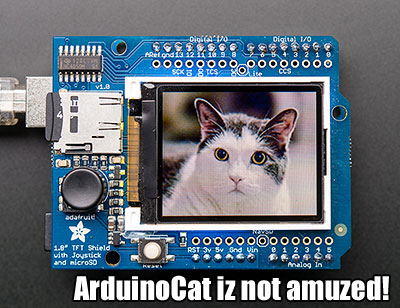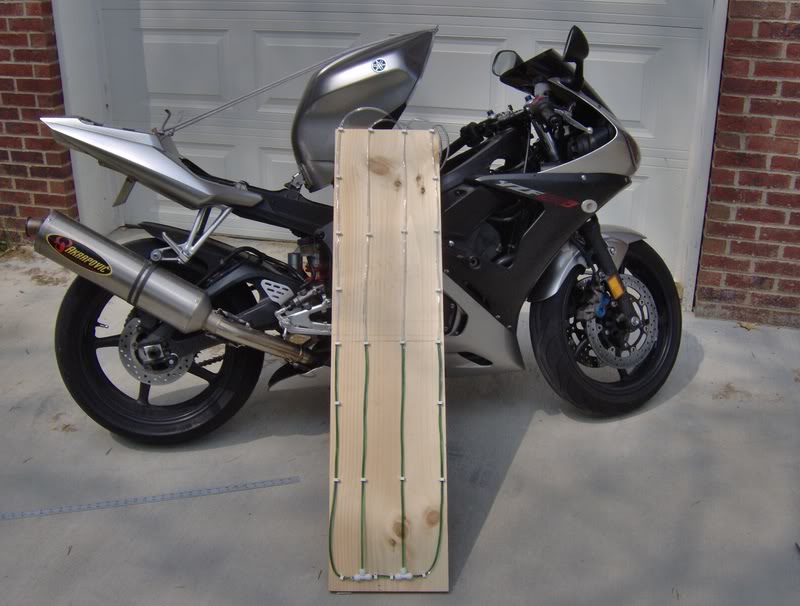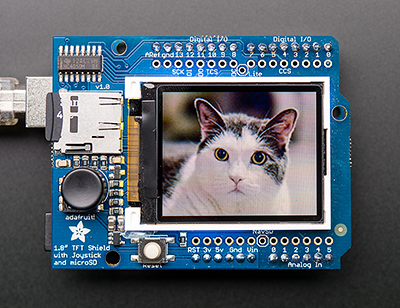|
|

|
Porsche, and the Porsche crest are registered trademarks of Dr. Ing. h.c. F. Porsche AG.
This site is not affiliated with Porsche in any way. Its only purpose is to provide an online forum for car enthusiasts. All other trademarks are property of their respective owners. |
|
|
| McMark |
 Oct 15 2013, 10:39 PM Oct 15 2013, 10:39 PM
Post
#1
|
|
914 Freak!                Group: Retired Admin Posts: 20,179 Joined: 13-March 03 From: Grand Rapids, MI Member No.: 419 Region Association: None |
EDIT: I know about tube-and-water setups. You can't drive with those. I'm building some different.
I've been pondering this project for awhile, and now I'm finally getting ready to start. Every time I synch carbs I think about how terrible and approximate the process is. What I'm going to try is using a small, programmable computer called an Arduino. There are add-ons called Shields to expand the functionality, and I'm using a LCD screen shield. I'm going to hook up 4 to 6 MAP sensors to the Arduino and output their readings on the screen. Using this tool, I'll be able to numerically evaluate the relative balance of the carb throats. One possible shortcoming is that the intake pulses may create fluctuating values that are difficult to interpret. Although, I have some ideas that may deal with this. Some sort of averaging could help. (IMG:style_emoticons/default/idea.gif) Here's what the Arduino looks like (this is the Uno version) (IMG:http://www.914world.com/bbs2/uploads_offsite/www.adafruit.com-419-1381898348.1.jpg) Here's the screen shield (IMG:http://www.914world.com/bbs2/uploads_offsite/www.adafruit.com-419-1381898349.2.jpg) Here's the MAP sensors I'm going to start with. (IMG:http://www.914world.com/bbs2/uploads_offsite/thumbs4.ebaystatic.com-419-1381898350.3.jpg) I'm also probably going to have to make some plates that will go between the carb and manifold with a vacuum port on it. This would be the easiest way to access manifold vacuum since I can't count on carbs to have vacuum ports. Oh, and this will also be useable while driving to evaluate dynamic synch. |
  |
Replies(1 - 19)
| stugray |
 Oct 15 2013, 10:44 PM Oct 15 2013, 10:44 PM
Post
#2
|
|
Advanced Member     Group: Members Posts: 3,825 Joined: 17-September 09 From: Longmont, CO Member No.: 10,819 Region Association: None |
If you are interested in Arduino, checkout sparkfun
I drive by their warehouse every morning. Let me know if you need any code help. |
| euro911 |
 Oct 15 2013, 10:56 PM Oct 15 2013, 10:56 PM
Post
#3
|
|
Retired & living the dream. God help me if I wake up!      Group: Members Posts: 8,860 Joined: 2-December 06 From: So.Cal. & No.AZ (USA) Member No.: 7,300 Region Association: Southern California 
|
|
| McMark |
 Oct 15 2013, 11:26 PM Oct 15 2013, 11:26 PM
Post
#4
|
|
914 Freak!                Group: Retired Admin Posts: 20,179 Joined: 13-March 03 From: Grand Rapids, MI Member No.: 419 Region Association: None |
Attached image(s) 
|
| rick 918-S |
 Oct 16 2013, 12:13 AM Oct 16 2013, 12:13 AM
Post
#5
|
|
Hey nice rack! -Celette                Group: Members Posts: 20,825 Joined: 30-December 02 From: Now in Superior WI Member No.: 43 Region Association: Northstar Region 

|
Sound is how I used to tune my triple Holley's on my big block. I wonder if you can add a mic function with a oscilloscope type output to the screen as a veri-able. Ya, I have no clue what I'm purposing. (IMG:style_emoticons/default/screwy.gif) (IMG:style_emoticons/default/wacko.gif) (IMG:style_emoticons/default/blink.gif)
|
| pcar916 |
 Oct 16 2013, 06:24 AM Oct 16 2013, 06:24 AM
Post
#6
|
|
Is that a Lola?    Group: Members Posts: 1,523 Joined: 2-June 05 From: Little Rock, AR Member No.: 4,188 Region Association: None 
|
Sound is how I used to tune my triple Holley's on my big block. I wonder if you can add a mic function with a oscilloscope type output to the screen as a veri-able. Ya, I have no clue what I'm purposing. (IMG:style_emoticons/default/screwy.gif) (IMG:style_emoticons/default/wacko.gif) (IMG:style_emoticons/default/blink.gif) This will be interesting to see if you can get all 4 or 6 outputs on the same screen. Or are you going to use a numerical index if the screen won't print nice lines? The Arduino microcontroller works at 16MHz. I don't remember the video resolution on that shield's screen. If that shield can't keep up with all 4 or 6 simultaneously ... If you used the Arduino and output the screen info to a Raspberry Pi (faster and HDMI video output) or BeagleBone (faster yet). Both are Linux single-boards. The RPi has the best video resolution by far. Or you could remote into either of the Linux boards with JuiceSSH (or something like it) and get the output on your laptop/notebook. I've only used the Arduino for stepper/servo/motor control and basic inputs like temperature, vibration, joysticks etc, and never played with a screen output directly from the Arduino. Very cool project on a really fun platform! Let us know. Good Luck The Arduino |
| 914forme |
 Oct 16 2013, 07:50 AM Oct 16 2013, 07:50 AM
Post
#7
|
|
Times a wastin', get wrenchin'!     Group: Members Posts: 3,896 Joined: 24-July 04 From: Dayton, Ohio Member No.: 2,388 Region Association: None 
|
I'm also probably going to have to make some plates that will go between the carb and manifold with a vacuum port on it. This would be the easiest way to access manifold vacuum since I can't count on carbs to have vacuum ports. Oh, and this will also be useable while driving to evaluate dynamic synch. Small feeds or offices much like you do when using a single map and ITBs. It will be interesting. What ever happened to large water draw vacuum tubes. to measure balance?  The small tubes in this example means its extremely sensitive. Larger Tubes would cut down on the sensitivity. Also larger decrease accuracy a little. I had one of these once, worked great. Don't get me wrong cool project, I just would rather spend my time and $$ doing other items that benefited my time and $$$. If its is just for your enjoyment then carry on. |
| JStroud |
 Oct 16 2013, 07:51 AM Oct 16 2013, 07:51 AM
Post
#8
|
|
Senior Member    Group: Members Posts: 1,463 Joined: 15-January 11 From: Galt, California Member No.: 12,594 Region Association: Northern California |
Sounds like a good idea, Surprised nothing like that already exists, carbs have been around awhile, and the better synced the better they run.
Putting a plate between the carb and manifold seems like it would work to get a vacuum port....but when cars come in to be tuned, you would have to put a plate under each carb first, seems like something that could clamp/attach to the top with a vacuum port would be more universal and easier to use on all cars, just a thought....what do I know....I hate carbs. (IMG:style_emoticons/default/shades.gif) Jeff |
| Matt Romanowski |
 Oct 16 2013, 09:12 AM Oct 16 2013, 09:12 AM
Post
#9
|
|
Senior Member    Group: Members Posts: 878 Joined: 4-January 04 From: Manchester, NH Member No.: 1,507 |
Why do you feel the regular methods are not accurate enough?
|
| jaxdream |
 Oct 16 2013, 11:01 AM Oct 16 2013, 11:01 AM
Post
#10
|
|
Senior Member    Group: Members Posts: 974 Joined: 8-July 08 From: North Central Tennessee Member No.: 9,270 Region Association: South East States |
I say go for it !!! You seem to be always looking to come up with something usefull and incorparating some of the latest technology , heck if this stuff was around when the idea of measured data started to be used ,THEY would have used it . Nothing ventured , nothing gained . Perhaps some kind of vacum resiviour for the MAP sensors to eliviate the pulses , or a vacum check valve . Experiment away to your heart's desire (or wallet ) !!!! (IMG:style_emoticons/default/piratenanner.gif) (IMG:style_emoticons/default/aktion035.gif)
Jack |
| SirAndy |
 Oct 16 2013, 11:23 AM Oct 16 2013, 11:23 AM
Post
#11
|
|
Resident German                          Group: Admin Posts: 41,944 Joined: 21-January 03 From: Oakland, Kalifornia Member No.: 179 Region Association: Northern California |
Some sort of averaging could help. (IMG:style_emoticons/default/idea.gif) If you need some help with that let me know, we do that sort of thing on a daily basis. Besides just averaging out your samples you also want to throw away your high and low spikes. Just don't trow away your good data if you are oscillating between high and low. (IMG:style_emoticons/default/shades.gif) |
| McMark |
 Oct 16 2013, 12:14 PM Oct 16 2013, 12:14 PM
Post
#12
|
|
914 Freak!                Group: Retired Admin Posts: 20,179 Joined: 13-March 03 From: Grand Rapids, MI Member No.: 419 Region Association: None |
This will be interesting to see if you can get all 4 or 6 outputs on the same screen. Or are you going to use a numerical index if the screen won't print nice lines? I'll have to deal with this as it comes up. Not worth speculating. There also may be some old school efficiency tricks out there as well. Once upon a time coders had to be really creative writing their code to optimize for the platform restrictions. The Arduino microcontroller works at 16MHz. I don't remember the video resolution on that shield's screen. If that shield can't keep up with all 4 or 6 simultaneously ... What ever happened to large water draw vacuum tubes. to measure balance? I have one of those I've never used because it's so impractical. I'm sure it would work just fine, but I'm hoping for something that can be used while driving as well.Don't get me wrong cool project, I just would rather spend my time and $$ doing other items that benefited my time and $$$. If its is just for your enjoyment then carry on. Putting a plate between the carb and manifold seems like it would work to get a vacuum port....but when cars come in to be tuned, you would have to put a plate under each carb first, That's the idea. I very often weld in O2 sensor bungs on cars that come in. Installing plates permanently underneath the carbs would be my approach. I could even make them out of some phenolic material to help with heat transfer.Why do you feel the regular methods are not accurate enough? I guess to be clear, they are accurate enough but again, this info can't be assessed while driving. If you need some help with that let me know, we do that sort of thing on a daily basis. Will do. I'm planning on keeping this thread up to date including code. I know we have a lot of coders here and I'm looking at this as a bit of an open source project. Hopefully with more eyes the code can evolve in efficiency and accuracy. |
| OU8AVW |
 Oct 16 2013, 02:08 PM Oct 16 2013, 02:08 PM
Post
#13
|
|
Yacht Rigger    Group: Members Posts: 1,803 Joined: 1-October 08 From: Granbury, TX Member No.: 9,601 Region Association: Southwest Region |
Your set up is real nice, but I'm way ahead of you....
ADMIN EDIT: Yer boobs belong to the Sandbox! |
| Harpo |
 Oct 16 2013, 03:19 PM Oct 16 2013, 03:19 PM
Post
#14
|
|
Senior Member    Group: Members Posts: 1,304 Joined: 21-August 11 From: Motor City aka Detroit Member No.: 13,469 Region Association: None |
Nice and I'm not even in the sand box!
|
| bfrymire |
 Oct 16 2013, 07:40 PM Oct 16 2013, 07:40 PM
Post
#15
|
|
Salsaholic    Group: Members Posts: 590 Joined: 1-August 04 From: Sunnyvale, CA Member No.: 2,431 Region Association: Northern California |
This looks like fun. Couple of comments. I think that a flow meter would work much better rather than a MAP sensor. I did a quick search and could not find the ones i have encountered before. So, I looked at MAFs, which were way too expensive.
Hum. Well, all a MAF is, is a wire heated to temperature and as air flows over it, the temperature of the wire fluctuates and hence its resistance. So, if you used the Arduino ADCs to measure a voltage across the wire, you could sense the air flow. So, it is possible to build your own MAF. Just a thought. As far as averaging, you have to determine the type of signal you are trying to measure. Signals will have a low frequncy content (Usually what you are trying to measure) and a high frequency content (noise in this case.) Well, if you use standard averaging, you will get a flat line response and loose all of the low frequency content, such as air flow fluctuation. However, using box car averaging you will get some noise rejection, and still retain the low frequency content. Have you thought about how to display to data to make it easy to adjust? This is me is similar to leveling signals, so, I have used a contour plot to display the data and put a "leveling bubble" on it to represent the center of all four corners, and then you adjust to "bubble" to center. Again, just a thought. BUt, it sure looks like fun! -- brett |
| Mike Bellis |
 Oct 16 2013, 10:04 PM Oct 16 2013, 10:04 PM
Post
#16
|
|
Resident Electrician      Group: Members Posts: 8,346 Joined: 22-June 09 From: Midlothian TX Member No.: 10,496 Region Association: None 

|
This looks like fun. Couple of comments. I think that a flow meter would work much better rather than a MAP sensor. I did a quick search and could not find the ones i have encountered before. So, I looked at MAFs, which were way too expensive. Hum. Well, all a MAF is, is a wire heated to temperature and as air flows over it, the temperature of the wire fluctuates and hence its resistance. So, if you used the Arduino ADCs to measure a voltage across the wire, you could sense the air flow. So, it is possible to build your own MAF. Just a thought. As far as averaging, you have to determine the type of signal you are trying to measure. Signals will have a low frequncy content (Usually what you are trying to measure) and a high frequency content (noise in this case.) Well, if you use standard averaging, you will get a flat line response and loose all of the low frequency content, such as air flow fluctuation. However, using box car averaging you will get some noise rejection, and still retain the low frequency content. Have you thought about how to display to data to make it easy to adjust? This is me is similar to leveling signals, so, I have used a contour plot to display the data and put a "leveling bubble" on it to represent the center of all four corners, and then you adjust to "bubble" to center. Again, just a thought. BUt, it sure looks like fun! -- brett (IMG:style_emoticons/default/agree.gif) with the MAF's. This way you could see flow at high rpm too. A MAP will loose signal off idle unless it is a pressurized system. VW/Bosch (type) MAF's are pretty cheap and are voltage based. GM MAF's are frequency based if you want to go that route. |
| stugray |
 Oct 16 2013, 11:52 PM Oct 16 2013, 11:52 PM
Post
#17
|
|
Advanced Member     Group: Members Posts: 3,825 Joined: 17-September 09 From: Longmont, CO Member No.: 10,819 Region Association: None |
You dont need to overthink this one.
Since these are not being used to measure an absolute value for flow (like used in FI), but a relative flow between cylinders. As long as the sensors are all mounted the same and calibrated simultaneously for the no-flow case (atmospheric pressure for baseline), they should work well for showing balance between cylinders with fairly simple averaging. If you need fancy, then a "simple" Kalman Filter would be fun |
| McMark |
 Oct 17 2013, 01:59 PM Oct 17 2013, 01:59 PM
Post
#18
|
|
914 Freak!                Group: Retired Admin Posts: 20,179 Joined: 13-March 03 From: Grand Rapids, MI Member No.: 419 Region Association: None |
QUOTE A MAP will loose signal off idle unless it is a pressurized system. They don't lose signal. They only drop to "zero" at WOT. But even then if there were a difference you would see different values close to "zero". |
| McMark |
 Nov 16 2013, 11:28 PM Nov 16 2013, 11:28 PM
Post
#19
|
|
914 Freak!                Group: Retired Admin Posts: 20,179 Joined: 13-March 03 From: Grand Rapids, MI Member No.: 419 Region Association: None |
Started working on this project this weekend. Got the board soldered, ran the test code to make sure it worked, then started working out the layout. Runs pretty fast and seems like it'll work well.
This is just with random values. https://www.youtube.com/watch?v=3pBbAG4x0P0 Now I need to start working on averaging. Feel free to post detailed averaging formula/code/links. |
| bulitt |
 Nov 17 2013, 07:53 AM Nov 17 2013, 07:53 AM
Post
#20
|
|
Achtzylinder     Group: Members Posts: 4,188 Joined: 2-October 11 Member No.: 13,632 Region Association: South East States |
Another alternative -purchase a used flow bench (small for motorcyle heads), or buy this flowquick from Audietech.com and build a bench with a vacuum motor. You would probably have to remove each carb to test on the bench though.
Nice!- (IMG:http://www.914world.com/bbs2/uploads/post-2388-1381931360.jpg) |
  |
1 User(s) are reading this topic (1 Guests and 0 Anonymous Users)
0 Members:

|
Lo-Fi Version | Time is now: 26th December 2024 - 07:30 PM |
Invision Power Board
v9.1.4 © 2024 IPS, Inc.










